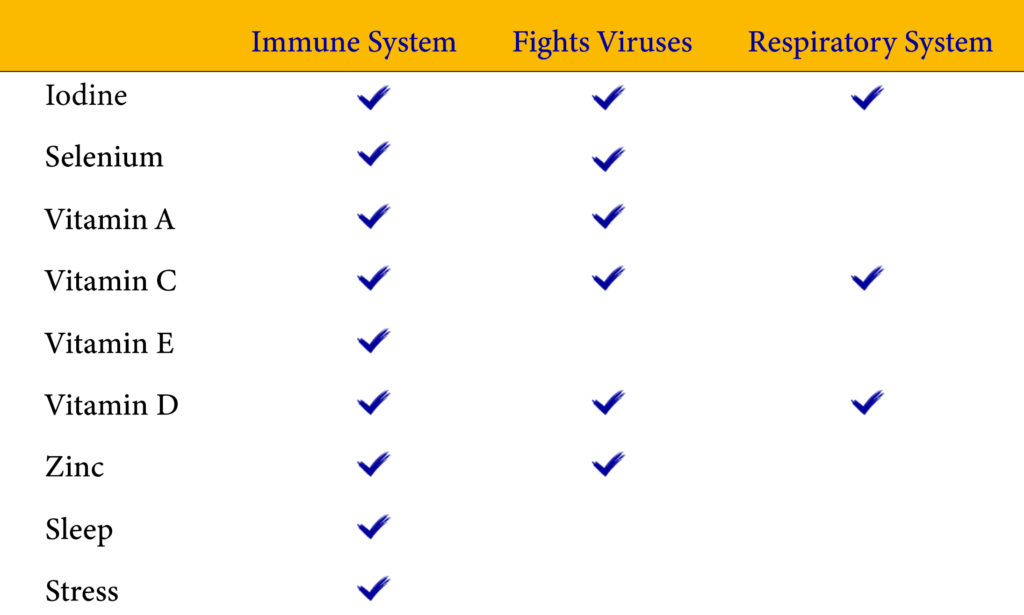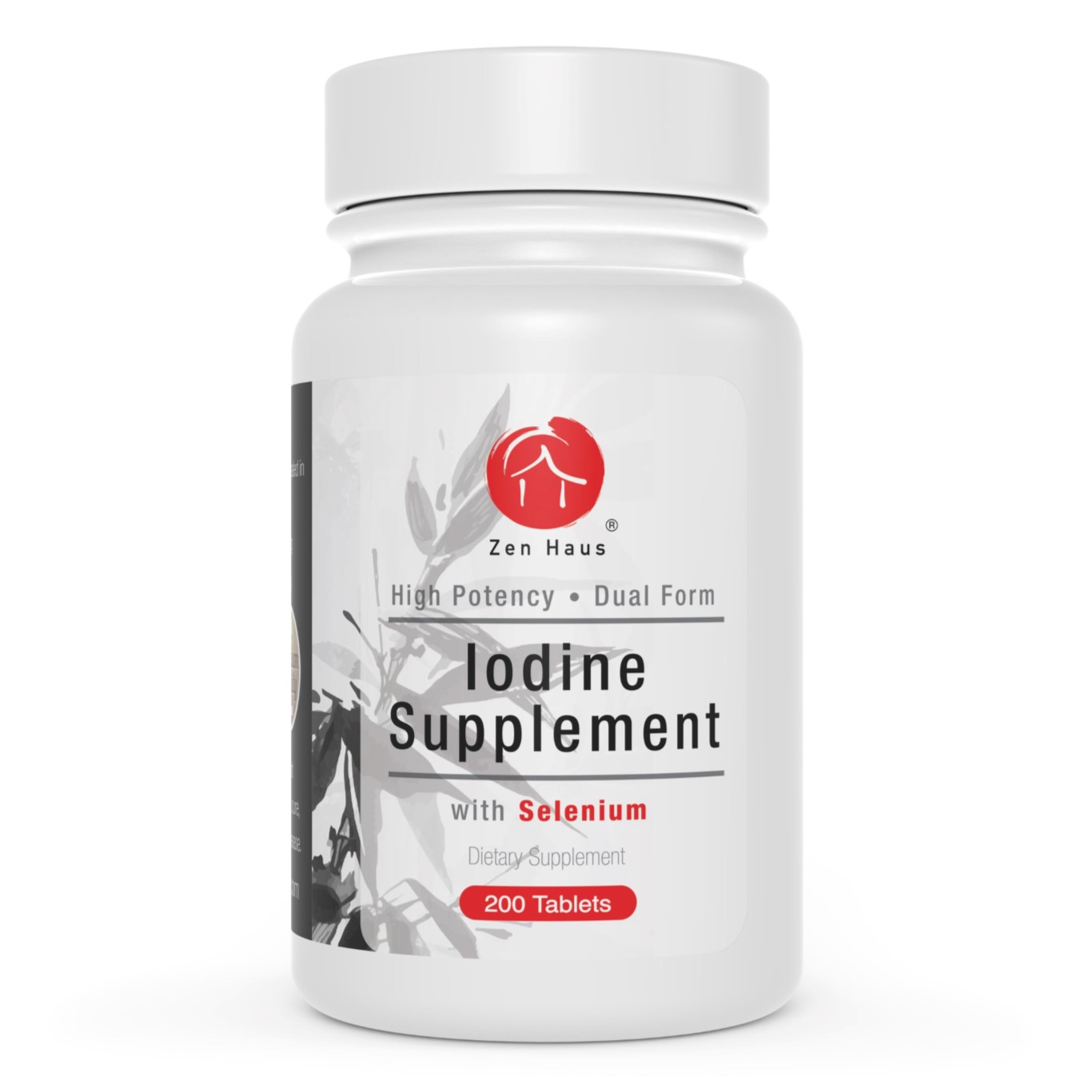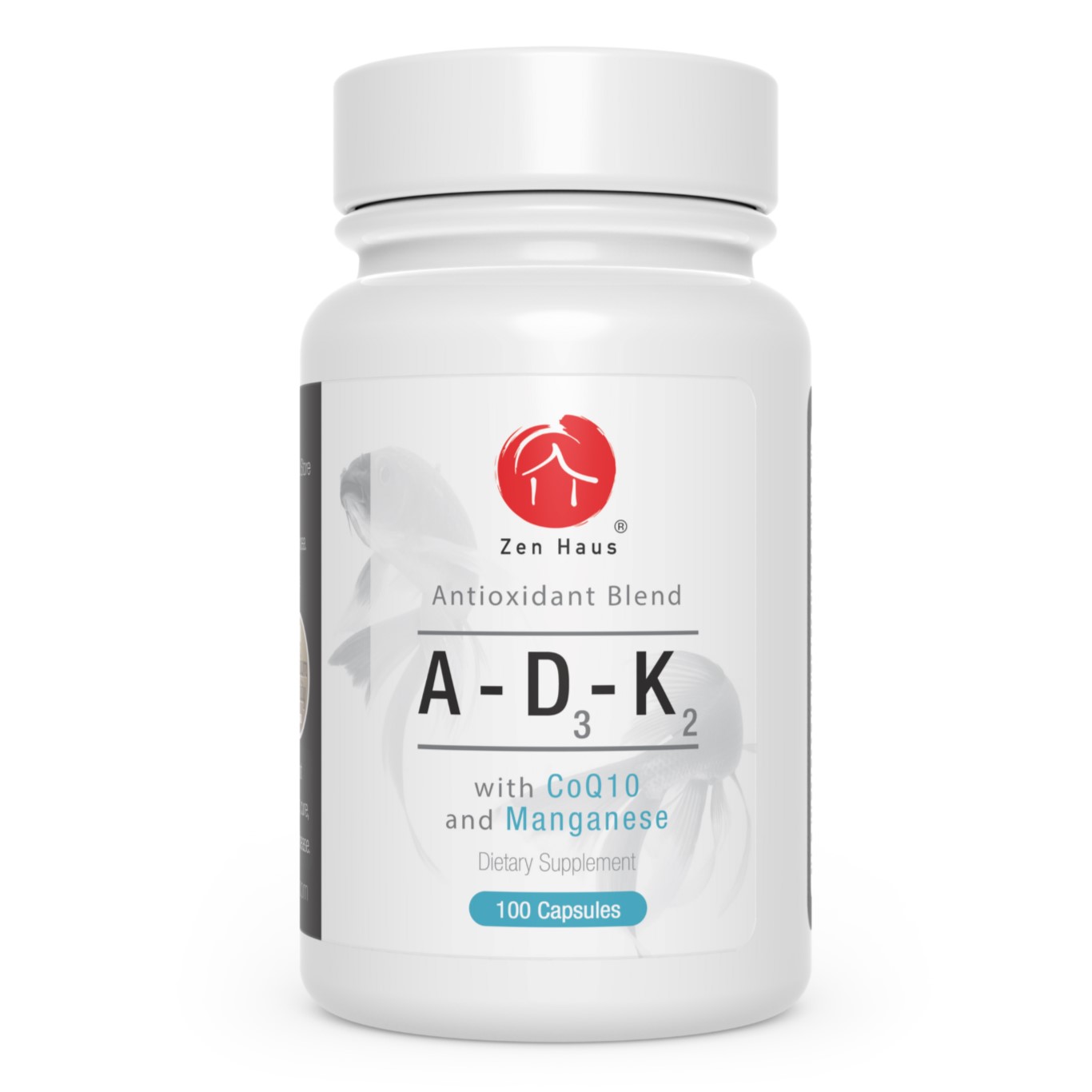Coronavirus, The Immune System and Stress
Part II
…your body fights the (COVID-19) illness.
United Kingdom National Health Service
In Part I we discussed what the Coronavirus is and why we need to bolster our immune systems to help defend against it and other diseases. Iodine was identified as nutrient that provides immune support to help fight off viruses. We now continue our discussion with other nutrients as well as sleep and stress management.

Selenium
Dietary selenium is essential for an optimum immune function. However, the mechanisms are not always fully understood and the immune system function can be impaired under conditions of selenium deficiency. Research shows mixed results and some pathogens may themselves benefit from higher levels of selenium.7,8
Supplementation above the recommended levels has been shown to provide sound immune support and resistance to viral infections and in animal models and human studies.9 Selenium deficiency has been associated with increased incidence, severity and progression of viral infections such as influenza and HIV.
Viruses and Selenium
Regular supplementation with selenium may also improve supportive care and strengthen the immune system of patients suffering from newly emerging viral diseases.10 Studies using mice have shown that viral symptoms and infection times are more severe when dietary selenium is deficient.
The virus itself needs selenium as a protection against free radicals. When a virus enters a human lacking selenium it can undergo mutations and become far more dangerous.
Adequate selenium nutrition should be considered as a defense against viral infectious diseases as it will provide immune support, can reduce infection times and severity, and help prevent unwanted and potentially dangerous virus mutations.
Vitamins A, C, E, D
Vitamin C
Vitamin C plays a key role in reducing inflammatory responses and preventing the common cold.
Vitamin C deficiency results in impaired immunity and higher susceptibility to infections. Infections effectively use up Vitamin C in the body due to enhanced inflammation and metabolic requirements. Supplementing with Vitamin C also helps prevent and treat respiratory and systemic infections.
Vitamin C is an essential part of the skin’s defense system. It is actively transported to the skin to help strengthen the skin’s barriers and act as an antioxidant.11
Viruses and Vitamin C
Maintaining sufficient levels of Vitamin C in the plasma by the continuous uptake through the diet or supplement could effectively prevent pathogenesis of influenza virus at the initial stage of infection.12
In response to the outbreak of COVID-19 in Wuhan, China, there has been on-going studies on Vitamin C for viral pneumonia. A few studies have shown that Vitamin C deficiency is related to the increased risk and severity of influenza infections. It is believed that Vitamin C infusion can help improve the prognosis of patients with severe acute respiratory infection.
Richard Cheng MD, PhD, Chinese Edition Editor of the Orthomolecular Medicine News Service states there are at least three clinical trials in China studying the effects of high-dose IV Vitamin C for the treatment of COVID-19. The Shanghai Medical Association has released an expert consensus statement on the comprehensive treatment of COVID-19 where they endorse the use of high-dose IV Vitamin C for the illness. Dr. Cheng states that the principal investigator of the first high-dose IV Vitamin C trial in China has told him that the preliminary results of the study are promising.
Vitamin A
Vitamin A’s effect on immune function has been studied at the molecular level. Vitamin A is involved in the development of the immune system and plays regulatory roles in cellular immune responses and humoral immune processes.13 Research is ongoing about the therapeutic effects of Vitamin A on preventing and curing various infectious diseases.
Several immune system functions depend on Vitamin A. Genes involved in immune responses are regulated by Vitamin A.14 It is essential for preventing serious conditions like cancer and autoimmune diseases, but also common illnesses like the flu or common colds. Vitamin A ensures better immunity by keeping mucus membranes moist. Which also enhances the activity of white blood cells.
Viruses and Vitamin A
Clinical trials suggest that Vitamin A supplementation reduces morbidity and mortality in different infectious diseases, including human immunodeficiency virus infection.15 Some studies suggest having Vitamin A along with Vitamin D can be more effective for fighting viruses.16
Vitamin E
Vitamin E offers various benefits by way of immune support and has been shown to enhance immune responses in animal and human models while offering protection against several infectious diseases.17 Supplementation of elderly individuals has been shown to enhance their immune response.18
Vitamin E modulates T cell function through directly impacting T cell membrane integrity, signal transduction, and cell division.19 T cells are a type of immune cell that fight against intracellular pathogens. This includes virus-infected cells such as flu, HIV, herpes and cancer cells. Vitamin E also indirectly affects inflammatory mediators generated from other immune cells. Modulation of immune function in this way is significant because it affects host susceptibility to infectious diseases such as respiratory infections.
Viruses and Vitamin E
In a study where influenza virus infections were tested on mice, Vitamin E was the most effective antioxidant.20 It was superior in preventing oxidative damage through its free-radical scavenging activity. Though Vitamin E does not possess specific antiviral action, the antioxidant effect plays an important role in lung and liver protection.
Vitamin D
Vitamin D is said to have a natural influence on the immune system. Vitamin D receptors are found in most immune cells. It helps maintain healthy immune cell development, differentiation and migration. Higher levels of Vitamin D are associated with proper cytokine production which is important for signalling in the immune system. Higher serum levels are also linked to the body’s local antioxidant defenses being enhanced. Vitamin D is known to enhance the function of immune cells, including T-cells and macrophages, that protect your body against pathogens.
T cells are a type of white blood cell and is a component of the immune system. T cells rely on Vitamin D to become active. If Vitamin D serum levels are too low, T cells can remain dormant and will not respond to the threat from infections and harmful microorganisms. Carsten Geisler, of Copenhagen University’s Department of International Health, Immunology and Microbiology, proposes that when a T cell is exposed to a foreign harmful microorganisms, the T cell searches for Vitamin D. The T cell must have Vitamin D for activation of the cell to continue with the appropriate response.21 If the T cells cannot find enough Vitamin D in the blood, they will not begin to mobilize.
Regulatory T cells are important because they let the immune system know which cells are friendly and avoid treating them as foreign threats. In this way, the regulatory T cells soften the immune response and help prevent the immune system from attacking normal healthy cells. In other words, Vitamin D modulates immune system responses. Deficiency in Vitamin D is associated with increased autoimmunity as well as an increased susceptibility to infection. Those with higher levels of Vitamin D are less likely to suffer autoimmune diseases, including type 1 diabetes and multiple sclerosis.22
Studies indicate that populations with limited sunlight exposure or Vitamin D deficiency have been found to have weakened immune systems compared to populations with greater exposure to direct sunlight. They also tend to have a higher incidence of heart disease and poor lung function. Adequate Vitamin D concentrations play an important role in protecting against upper and lower respiratory tract infections.23 Vitamin D deficiency is associated with increased risk and greater severity of infection, particularly of the respiratory tract.24 Overall, Vitamin D supplementation has been deemed safe at amounts that protect well against acute respiratory tract infection.25
Viruses and Vitamin D
Evidence suggests that Vitamin D plays a major role in regulating the immune system, including immune responses to viral infection. Interventional and observational epidemiological studies provide evidence that Vitamin D deficiency may confer increased risk of influenza and respiratory tract infection. Vitamin D deficiency is also prevalent among patients with HIV infection. Cell culture experiments support the thesis that Vitamin D has direct antiviral effects particularly against enveloped viruses.26 Enveloped viruses are wrapped in an outer coat that is made from a small piece of the cell’s membrane. All coronaviruses, including COVID-19, are enveloped viruses.
In a study of Japanese schoolchildren, Vitamin D supplements taken during the winter months reduced seasonal flu and asthma attacks. According to Dr. Mitsuyoshi Urashima of Jikei University School of Medicine, Tokyo, the idea for the study stemmed from an earlier one looking at whether the supplement could help prevent osteoporosis. Dr. Urashima noticed that subjects taking Vitamin D were much less likely to report cold and flu symptoms.27
Summary for Vitamin D
Many people staying indoors will produce less Vitamin D. Vitamin D is known to enhance the function of immune cells, including T cells and macrophages. It modulates immune responses and can mitigate issues with autoimmunity. Vitamin D deficiency is associated with poor lung function and respiratory tract infections. Evidence suggests that Vitamin D plays a major role in regulating immune functions, including immune responses to viruses. Studies have shown that subjects taking Vitamin D were less likely to report flu symptoms.
Zinc
Zinc affects multiple aspects of the immune system. Diminishing zinc could be a major factor in the age-associated decline of immune function. Zinc deficiency causes a decrease in both innate and adaptive immunity.
Zinc deficiency adversely affects the growth and function of B cells (a type of white blood cell) and T cells. In studies on experimental human models of Zinc deficiency, it was shown that decreased serum testosterone level had a large negative effect on T helper cells.28
Viruses and Zinc
You may have heard of a malaria drug named Chloroquine that can be potentially used as a treatment for COVID-19. Chloroquine has been approved by Chinese, South Korean and Italian health authorities for the experimental treatment of COVID-19. The mechanism for this treatment is that Chloroquine helps get Zinc into the cell. It enhances Zinc inside the cell and Zinc is effective at limiting the virus’s ability to replicate. There have been some indications that Quercetin can also get Zinc into the cell and help prevent the virus from replicating. Research has been limited to lab studies however.
Sleep

Sleep and the circadian system exert a strong regulatory influence on immune functions. Studies show that people who sleep deprived, either by quality or duration, are more likely to get sick after being exposed to a virus. Lack of sleep also affects how fast you recover. Sleep deprivation is detrimental to immune function. Complex feedback loops involving cytokines appear to play a role in the regulation of non-REM sleep. The immune response to infection may result in changes to the sleep cycle.
When suffering from sleep deprivation, active immunizations may have a diminished effect and may result in lower antibody production, and a lower immune response. Proteins which have been shown to be closely intertwined with both T-cell differentiation and our circadian rhythms, can be affected through the disturbance of natural light and dark cycles.
Sleep and the intertwined circadian system have been shown to have strong regulatory effects on immunological functions affecting both the innate and the adaptive immunity. Cytokines are small proteins important in cell signaling. Pro-inflammatory cytokines, which respond to sleep cycles, stimulate immune functions such as immune cells activation, proliferation and differentiation.
Many of us will have more time to play with this can be used to catch up on sleep missed over the years. Schedule naps during the day and make a point of resting when mentally or physically tired. Learn about healthy sleeping habits by watching talks by sleep expert Matthew Walker and take steps to improve the quality of your sleep.
Stress

Chronic stress suppresses the immune system. Stress, fear and worry raises our cortisol levels and cortisol inhibits white blood cell function. The endless stream of news stories and social media posts about COVID-19 and a vulnerable economy that has flooded our minds has a real impact on our stress levels. Images of hospital wards, coffins and animated graphics showing the rapid spreading of disease is alarming on many levels. It is important to both heed the warning that COVID-19 could be a real threat to you and your community while also being mindful that you must actively manage the stress that comes along with these stories and the way they are presented.
Social distancing, a major component of the strategy advocated by health authorities, can also be a source of stress. The feeling of being disconnected is stressful and especially when it comes as a result of a global mandate to be at a distance from others.
Staying active and productive is a good way to cope with stress. Especially, if you are being proactive and the actions taken will in some way mitigate the stress. This is also a great opportunity to practice mindfulness and meditation. Many people will experience slower days during the pandemic and adjusting to the new pace can be both difficult and rewarding. Use this opportunity to master ‘going slowly’ and proceed through the days while observing yourself and being purposeful in everything you do. Managing stress is good for your health in general as well as your longevity. The one common trait centenarians around the world have is their ability to cope well with stressful events.
We will give Magnesium a quick mention here because it is known for contributing to both better sleep quality and reducing stress. In addition to providing a calming effect by promoting serotonin production, Magnesium supports the immune system and reduces inflammation.
Summary
In addition to taking measures to prevent infection of COVID-19 we can also bolster our immune system to better resist the infection if we should get it. Immune function may be compromised by having nutritional deficiencies, lack of sleep and chronic stress. The following chart outlines the benefits of key nutrients, sleep and managed stress when it comes to strengthening the immune system, resisting viruses and supporting the respiratory system.

We want to prevent infection by avoiding the viruses and also protecting ourselves in instances where we may have come into contact with the viruses. We can, perhaps, try to avoid the COVID-19 virus by practicing social distancing and limiting surface contact in public. We can better protect ourselves from the virus by washing hands regularly and after having contact with surfaces in public. We can also protect ourselves by getting iodine into our tissues and mucus. Finally, in the event we do contract the virus, we can be prepared by providing immune support so it can provide the best resistance.

Regardless of your stance on the severity of the COVID-19 threat and the health authority recommendations we should all take protective measures on the right side of this image. At minimum, protect yourself and your family by:
- Washing Hands Regularly
- Getting Iodine into the Tissues
- Adequate Immune Support
Health authorities openly acknowledge that the body fights the illness. This implies the immune system is paramount to surviving the illness. One may ask why these authorities do not recommend supplementation and other measures to provide immune support. One may want to take more responsibility for their own health.
.
.
.




